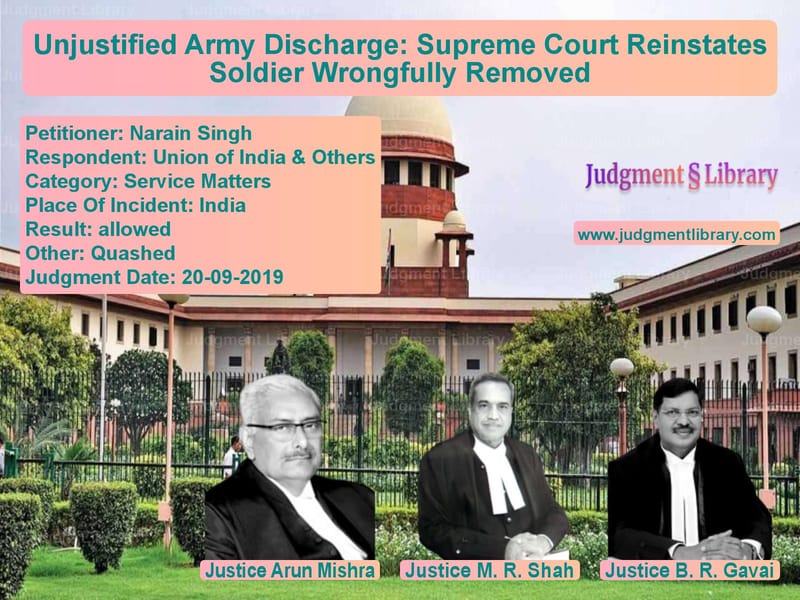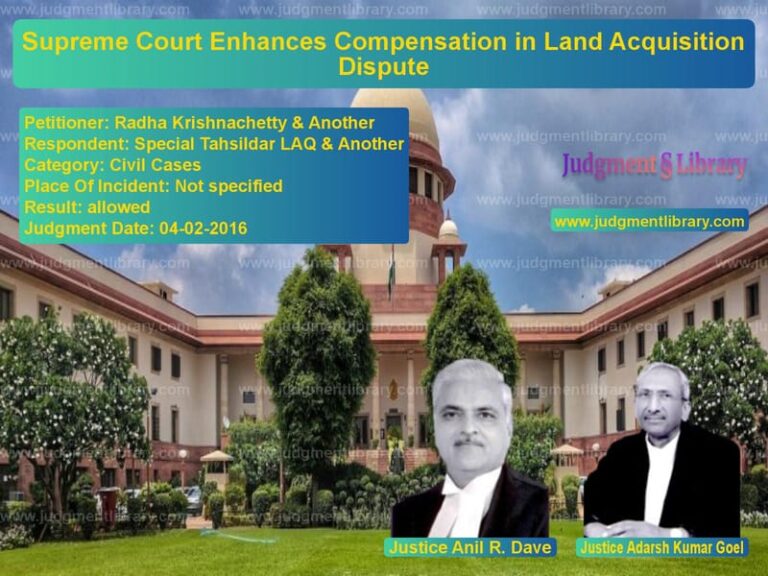Unjustified Army Discharge: Supreme Court Reinstates Soldier Wrongfully Removed
The case of Narain Singh v. Union of India & Ors. revolves around the wrongful discharge of a soldier from the Indian Army based on red ink entries. The Supreme Court of India was called upon to determine whether the discharge was justified and whether the appellant was entitled to reinstatement along with pensionary benefits.
Background of the Case
Narain Singh was enrolled in the Indian Army as a Driver on October 15, 1980. Over the years, he was promoted to the rank of Lance Dafedar. However, during his service tenure, he was penalized with four red ink entries between June 7, 1993, and May 3, 1994. Based on these entries, he was discharged from service under Rule 13(3)(III)(v) of the Army Rules, 1954.
Singh challenged his discharge before the Armed Forces Tribunal, Jaipur Bench, which dismissed his petition. Consequently, he approached the Supreme Court seeking reinstatement and pensionary benefits.
Petitioner’s (Narain Singh’s) Arguments
Narain Singh contended that:
- The discharge was arbitrary and solely based on four red ink entries, without considering his long tenure of service.
- All four entries were issued within a short span of one year, which indicated victimization rather than genuine disciplinary concerns.
- His service record before the red ink entries was clean, and the tribunal failed to consider the nature of the offenses for which the red ink entries were issued.
- The discharge order did not take into account that he was merely one year and five months away from qualifying for pensionable service.
- As per the ruling in Veerendra Kumar Dubey v. Chief of Army Staff, the presence of four red ink entries does not automatically justify discharge unless the nature of the misconduct is severe.
Respondents’ (Union of India’s) Arguments
The Union of India, through the Additional Solicitor General, argued that:
- Singh’s service record showed repeated disciplinary lapses, and awarding four red ink entries justified his discharge.
- The appellant did not challenge any of the red ink entries when they were issued, which implied that he had accepted them.
- The Army follows strict discipline, and personnel with multiple disciplinary issues are subject to discharge as per Rule 13(3)(III)(v) of the Army Rules, 1954.
- The discharge was in accordance with military law, and the Tribunal rightly upheld the decision.
Supreme Court’s Observations and Judgment
The Supreme Court analyzed the case, particularly focusing on whether the discharge was justified given the service tenure of the appellant. The Court observed:
“The appellant had rendered over 13 years of service and was merely one year and five months short of qualifying for pension. The red ink entries, while significant, do not automatically mandate discharge unless the nature of the misconduct is so severe that it renders the soldier unfit for continued service.”
The Court also noted:
“It is one thing to qualify for discharge consideration and another to be actually discharged. The competent authority is required to assess the nature of the offenses, the overall service record, and the individual’s contribution to the armed forces before making such a decision.”
Further, the Supreme Court found that:
- The authorities had acted mechanically without due consideration of Singh’s service tenure and past conduct.
- The red ink entries were not of such a grave nature that warranted discharge before completion of pensionable service.
- The discharge order was issued without following the principles laid down in Veerendra Kumar Dubey v. Chief of Army Staff, which emphasized a comprehensive assessment rather than an automatic discharge.
Accordingly, the Supreme Court set aside the discharge order and ruled in favor of reinstating Singh. The Court ordered that:
- Singh be treated as if he had continued in service until his pensionable tenure was completed.
- He is entitled to all pensionary benefits and back pay from the date of his wrongful discharge.
- The monetary benefits owed to him should be disbursed within four months from the date of judgment.
Key Takeaways from the Judgment
- Red Ink Entries Do Not Automatically Mandate Discharge: The Supreme Court emphasized that the presence of four red ink entries does not create an absolute requirement for discharge.
- Consideration of Service Tenure Is Essential: The Court underscored the importance of assessing a soldier’s long-term contribution before issuing a discharge order.
- Procedural Safeguards Must Be Followed: Military authorities must not act arbitrarily; they must weigh the gravity of the offenses before discharging personnel.
- Reinstatement with Pensionary Benefits: This case sets a precedent for similar cases where soldiers are discharged unfairly based on minor infractions.
Impact of the Judgment
- Strengthens Soldiers’ Rights: The ruling provides protection for soldiers against arbitrary dismissal based on minor disciplinary infractions.
- Guidelines for Future Cases: This judgment serves as a benchmark in cases involving discharge due to red ink entries.
- Ensuring Fair Implementation of Army Rules: It ensures that Army Rule 13(3)(III)(v) is not misused to prematurely discharge personnel.
Conclusion
The Supreme Court’s ruling in Narain Singh’s case is a landmark decision in service matters, reinforcing the principle that mere red ink entries do not justify automatic discharge. The judgment safeguards the rights of armed forces personnel, ensuring that procedural fairness is maintained in disciplinary actions. By ordering reinstatement and pension benefits, the Court has set a precedent that will likely influence future cases concerning wrongful discharge in the military.
Petitioner Name: Narain Singh.Respondent Name: Union of India & Others.Judgment By: Justice Arun Mishra, Justice M. R. Shah, Justice B. R. Gavai.Place Of Incident: India.Judgment Date: 20-09-2019.
Don’t miss out on the full details! Download the complete judgment in PDF format below and gain valuable insights instantly!
Download Judgment: Narain Singh vs Union of India & Oth Supreme Court of India Judgment Dated 20-09-2019.pdf
Direct Downlaod Judgment: Direct downlaod this Judgment
See all petitions in Disciplinary Proceedings
See all petitions in Termination Cases
See all petitions in Pension and Gratuity
See all petitions in Judgment by Arun Mishra
See all petitions in Judgment by Mukeshkumar Rasikbhai Shah
See all petitions in Judgment by B R Gavai
See all petitions in allowed
See all petitions in Quashed
See all petitions in supreme court of India judgments September 2019
See all petitions in 2019 judgments
See all posts in Service Matters Category
See all allowed petitions in Service Matters Category
See all Dismissed petitions in Service Matters Category
See all partially allowed petitions in Service Matters Category







